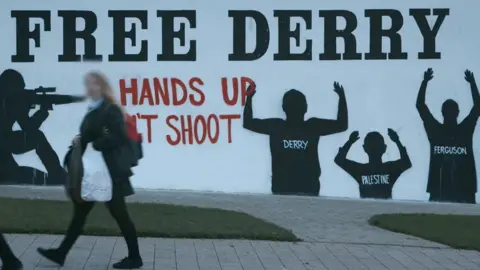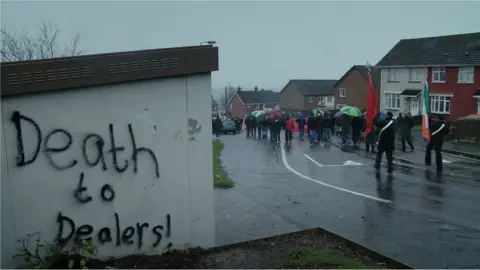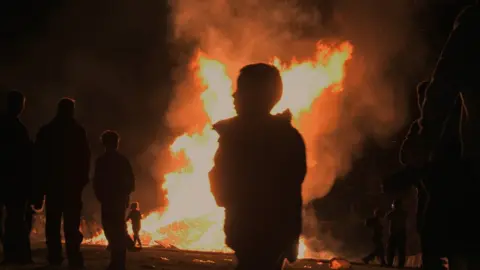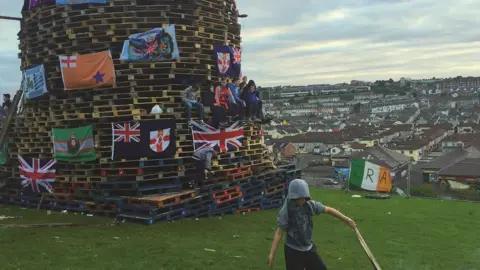A Derry mother's impossible choice focus of new film
 Blinder Films
Blinder FilmsThe trailer for A Mother Brings Her Son To Be Shot, a new documentary set in Londonderry, opens with a mundane domestic image - a mother dropping chips into a deep-fat fryer.
A mother cooking for her family, a typical image of comfort and protection.
But in post-conflict Northern Ireland, a mother's role can be skewed.
The question of how to nurture and protect can become bizarre and terrifying and involve impossible choices - the fryer or the firing line.
This impossible choice is the key action on which Sinéad O'Shea's film rests - a mother who must allow her son to be permanently maimed in order to protect his life.
The film, which was officially released earlier in September, charts a five-year span in the lives of Majella O'Donnell and her sons in Derry's Creggan estate - teenager Philly, who was kneecapped after being accused of drug dealing, and Kevin Barry, 11, a child at the film's start who ages through the run-time.
 Blinder Films
Blinder FilmsThe shooting that launched A Mother Brings Her Son To Be Shot happened in 2012, but the film's subject matter is a barely needed reminder that, while the Troubles officially ended 20 years ago, some communities in Northern Ireland are still entrenched in their own wars and traumas.
Up until August this year, there were 19 paramilitary-style shootings. There were 24 in 2017.
Despite those figures, the subject of communities policed by paramilitaries - and the despair and mental trauma inflicted on those caught in the crossfire of vigilantism - is not always discussed in public.
'Constant battle'
"We held a first screening in Derry and had a Q&A afterwards, but no-one asked any questions," Sinéad says.
"In Belfast, it was different. People were saying good and bad things about the film.
"But in Derry, it was a lot quieter. People seemed to have things to say but they were nervous. One woman did put up her hand and said the Good Friday Agreement hadn't worked for her.
"Another came up to me afterwards and told me the film was exactly what it was like in their community. But I didn't understand why they wouldn't say that openly."
Allow X content?
"The film is not an attempt to represent the whole of Derry. It's my experience in that community. My hope was to show that this isn't a black and white story - this is how people behaved and what they believed," she adds.
Despite the atmosphere in Derry, the film has been well received with its limited release playing to sizable audiences and positive notices from critics.
Screen Ireland has told the film-maker that it was one of the biggest openings for a documentary in Ireland, although she admits it had been a "constant battle" to get the self-distributed film into cinemas.
"But it's done so well and sold out everywhere it's shown," she adds. "Films like this are not supposed to do well."
 Blinder Films
Blinder FilmsSinéad was working as a filmmaker and journalist for Al Jazeera when she saw a news story pop-up on social media. It was about Majella and Philly's shooting, after he was accused of being a drug dealer.
The filmmaker went to Derry with the intention of filing a news report. She had no idea it would be the start of a five-year project.
"It had to be that way (a film) in the end," she says.
"I think if people knew I was there for just a few facts and figures, some sound bites, they wouldn't have trusted me.
"I knew I had to commit more to it. My background was filmmaking so I thought those were the sensibilities I had to bring to such an emotional story."
Through Hugh Brady, a community worker who figures heavily in the finished film, Sinéad got in touch with the O'Donnells. After months of visits, she earned enough trust to start filming.
The result is a film with a "universal" post-conflict story, albeit taking place in a unique community in an "ongoing state of emergency", she says.
'Telling stories'
"It's a society that is self-policing post-conflict. There are characters that are interesting and funny and human, and family drama. It goes beyond Northern Ireland."
It is also, she says, a film in which she is constantly second-guessing what people are telling her.
"The biggest surprise I found was how people would keep exaggerating and telling stories," Sinead says.
"You would hear a version of a story once, and then the next time you'd hear a different version.
"These stories were interesting, moving, entertaining - but were they true? I was told things so outlandish, things that sounded true that turned out to be false, things that sounded false were turned out to be true."
 Blinder Films
Blinder FilmsShe added: "I think it's performative in a way but also an indication of just how PTSD and other issues are affecting communities. People no longer care what happens or how they're feeling, and their perception changes. Everyone got used to delivering every story like it was the news."
She says it's an aspect of the film Northern Ireland audiences understand, along with its bleak humour.
"People in Northern Ireland laugh at this film," she says. "They have a sophisticated sense of humour.
"I think they understand this duality much better - that you can be an absolute monster but also quite nice, or you can be funny and awful at the same time."
The O'Donnell's have seen the film too, after the director showed it to them in their living room.
"They seemed to love it," she says.
While the film's bleak narrative offers no solutions for communities like Creggan, or families like the O'Donnells, the director reckons there is scope for new conversations around those left behind by the peace process.
"I don't think people in these communities get enough psychological support and they're given so little hope," she says.
"The employment issue is so troubling. The UK has just walked away from the community. I just found the whole situation very moving."
